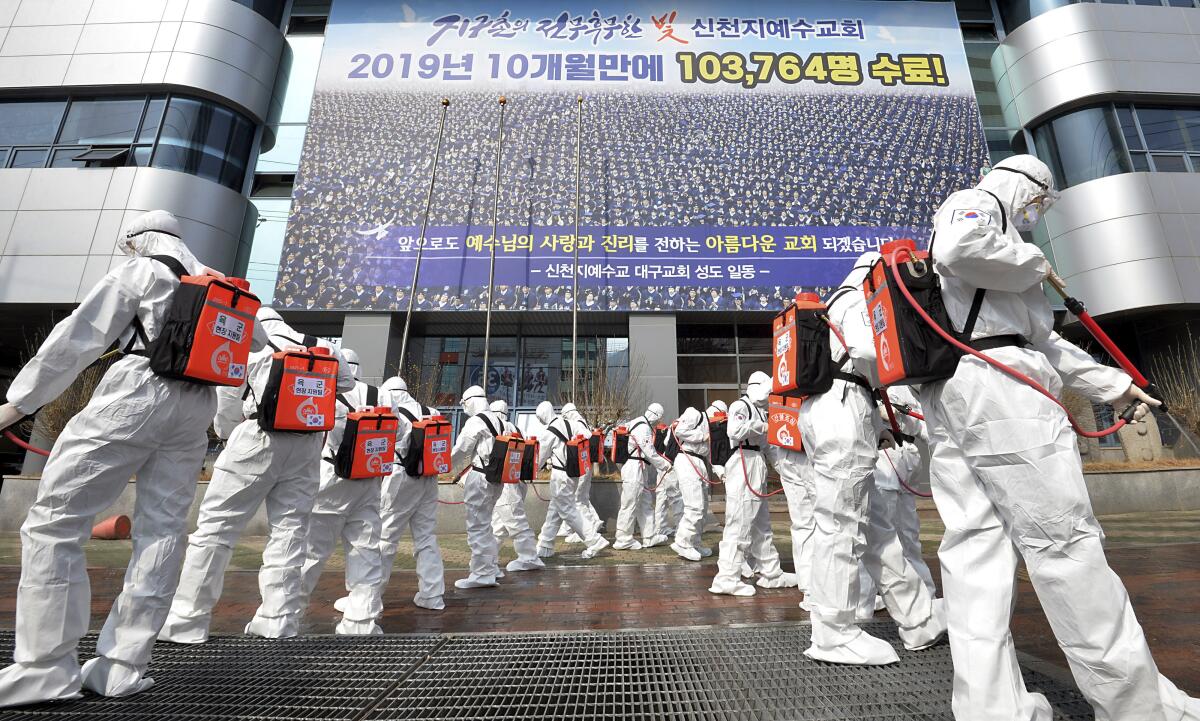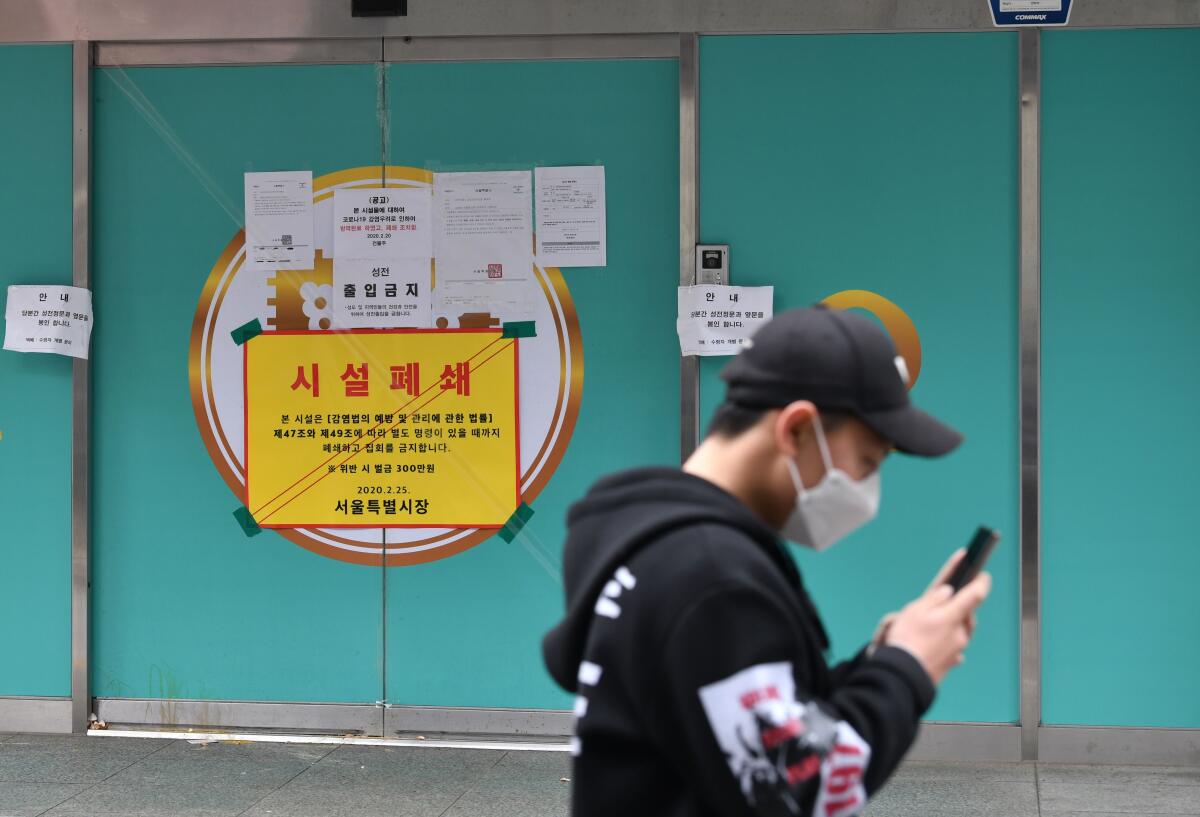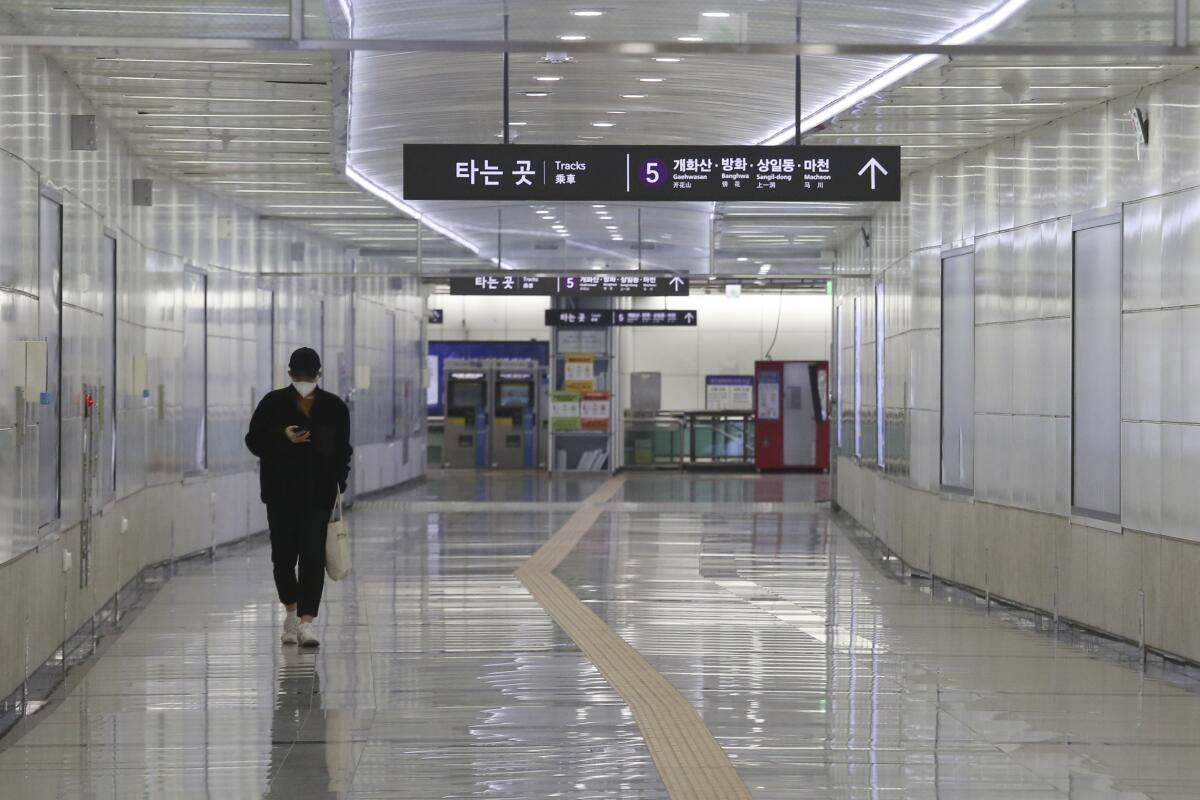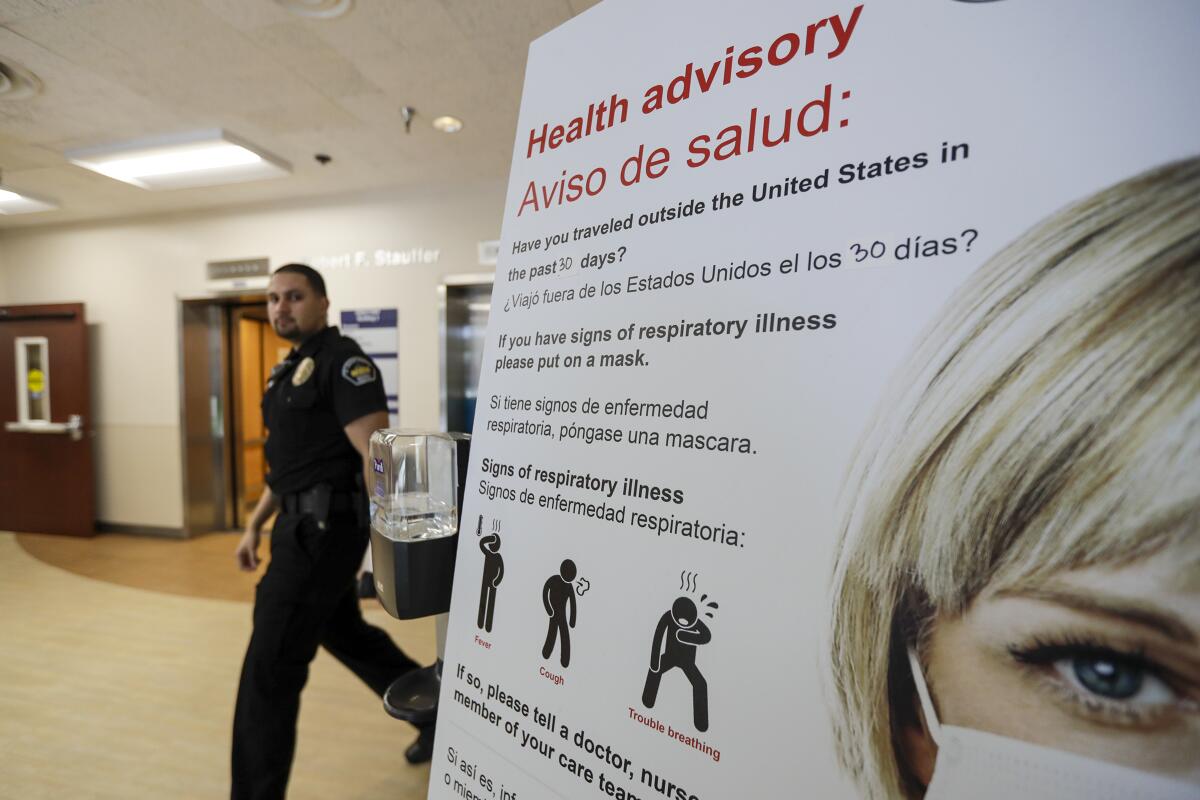Secrecy is paramount for South Korean sect linked to coronavirus surge. Many believers are in SoCal

SEOUL — It was only after months of Bible study classes, several exams based on those lessons and hundreds of hours spent with members of the religious community that Esau Martinez learned the name of the group that had come to dominate his daily life.
“We’re based in Korea; our organization is called Shincheonji,” members of his small group discreetly told him over Korean barbecue in Orange County, as if letting him in on a closely guarded secret, Martinez recalled. “We’re going to be passing over soon,” they told him. “We’re going to be signing the ‘Book of Life.’”
That day, Martinez, then a 19-year-old community college student, realized how methodically he had been approached, recruited and indoctrinated, starting from the moment a classmate casually invited him to play basketball.
Unbeknown to him, most of those on the court were members of the Shincheonji Church of Jesus, a South Korean doomsday Christian sect. Established in 1984, the church believes its 88-year-old South Korean founder is a “promised pastor” foretold in the New Testament who will live on forever — and that his followers will as well, if they convert enough people to their faith, according to former members.
The group has a growing presence in L.A. and in Orange County, with 545 people graduating from its Bible study program in June 2018, according to a blog post on its official website.
The fringe Christian sect — which some call a cult — has been on the receiving end of outrage and suspicion in recent days as authorities identified it as having been at the center of a rapid surge in coronavirus infections in the South Korean city of Daegu, where one of its major branches is located. More than 2,000 infections have been linked to the church and its members as of Sunday — more than half of all cases in South Korea so far. Authorities have pledged to find and test every one of the more than 210,000 congregants in South Korea.

Even a health official tasked with combating the coronavirus in a district clinic in Daegu was revealed to be a member of the church after he came down with COVID-19. On Sunday, a 45-day-old infant child of a Shincheonji follower became the youngest patient yet to be confirmed with the virus. At least two church members who contracted the virus have died, according to authorities.
The Seoul Metropolitan Government on Sunday reported Lee Man-hee, the church’s messianic leader, and other Shincheonji officials to prosecutors, saying they should face criminal charges for homicide and causing injury for withholding information amid the outbreak. The church said Monday that Lee himself had tested negative for the virus.
There is no indication any members in California, where the church also operates under the name Zion Mission Center, have been infected.
It remains unclear how members of the church were initially infected. Authorities on Sunday said entry and exit records showed some of those on Shincheonji’s roster had in January traveled to Wuhan, the epicenter of the outbreak, where the church acknowledged having sent missionaries in the past. South Korea issued travel alerts against all nonessential travel to Wuhan and surrounding areas but only on Jan. 28. The church claims to have some 19,000 believers in China, its biggest presence outside South Korea, but largely operates underground because of crackdowns against evangelism.
Before Feb. 18, when the first member of the church found to have the virus was diagnosed, South Korea had 30 confirmed cases. That 61-year-old woman had attended Sunday services in the preceding weeks with several hundred others, sitting tightly packed together on the floor as is the group’s custom.
Health officials who began testing those in attendance found hundreds of infections, and quickly discovered Shincheonji members elsewhere in the country had also contracted the virus.
Efforts to track infections have run up against the secrecy that is central to the group and its efforts to propagate its beliefs and the fact that many members hide their affiliation because of the church’s notoriety in South Korea, said Tark Ji-il, a professor of theology at Busan Presbyterian University, who has long studied the church and its teachings.
“They approach people hiding their affiliation because evangelism is so important,” he said. “They will hide that they are Shincheonji for as long as they can.”

A video on the official YouTube channel of Shincheonji, a fringe Christian sect, purports to show the story of the Bible as interpreted by the church in mass games performed by members in 2012.
On Monday, Lee held a news conference in South Korea. Over the clamor of protesters yelling on loudspeakers calling him a con man, Lee apologized to the South Korean people for the number of infections, his voice shaky and his glasses fogging up from a face mask. He bowed down to the floor before a phalanx of cameras.
The first question came from a reporter who asked if he believed he would live forever — a church official intervened, saying Lee would only answer questions about the coronavirus situation.
The church has said it is fully cooperating with authorities, immediately closing down its 1,100 facilities around South Korea and turning over a list of its 212,324 South Korean members on Tuesday — a week after the first Shincheonji member was diagnosed. It said it has also turned over the names of 33,281 overseas members.
“We ask everyone to acknowledge that Shincheonji members are one of the biggest victims of COVID-19, bearing the brunt of the virus spreading,” a church representative said in a statement, adding that members had been subject to “groundless slandering and hatred” since the outbreak.
The pleas have done little to quell blame directed at the group for the surge in infections. More than a million people signed an online petition to the South Korean president asking that the church be forcefully disbanded. Local officials in Gyeonggi province raided church headquarters in Gwacheon, saying it was being slow to turn over the roster of members. Authorities in Daegu enlisted 600 police investigators to track down church members who could not immediately be reached.
Kwon Nam-guy, a 14-year, high-ranking church member who left in 2006, said church members are trained to approach potential recruits under tailor-made pretenses, offering up career guidance, personality tests or even tarot card readings.
“We created that playbook. We would establish a strategy, each take on a role and approach people under those pretenses,” said Kwon, who now operates a counseling center and support group for defectors from Shincheonji.
Kwon joined the church as a 23-year-old, quitting his job and eventually rising through the ranks and marrying a fellow member. He said he decided to leave after seeing an all too human side of the “promised pastor” Lee.

Stella Kang, who returned to her native South Korea in 2014 after finishing college in Northern California, said she was offered free Bible classes on the street.
Kang, who was raised Adventist, took it as a sign from God. Two months into classes, she was told the identity of the group and instructed never to research it online, because of outside forces trying to “poison” members with slander.
Recruiting others was central to its teachings, Kang said. And she was good at it; she signed up a roommate and two other friends through months of contact and conversation.
“I believed I could have eternal life on this Earth,” said Kang, who left after about a year, when her parents intervened. “That’s how powerful that indoctrination can be.... Everyone around you believes that.”
“These are people that believe they’re going to live eternally, and physical bodies don’t matter. For them, what’s the point of a mask?” she said.

Martinez said at the beginning, the classes didn’t seem radically different from the beliefs of the church he’d grown up in. Over the months, some of the teachings began to seem more and more unconventional — about the South Korean man who would never die, and the 144,000 of his followers who would come to rule the world.
But he was instructed not to question teachings that other interpretations of the Bible were false, and all other pastors were frauds. He was also told not to tell friends or family, that the messages he was receiving were “hidden treasure.”
Attendance was considered of utmost importance — any time he would miss a class, he was hounded by his group leader or fellow church members. “You don’t notice it, but you start putting your friends aside, you start putting school second,” he said.
In a grandiose ceremony that the church called “passing over,” Martinez officially joined the church and was told his name was now in the “Book of Life.”
Cracks later formed in his belief, he said, when he was taught the concept of “circular reasoning” during a college philosophy class on logical fallacies. He began realizing how the church refuted any skepticism by pointing back to the lessons the church itself had encouraged him to take to heart.
The breaking point came on Mother’s Day, 2017. He says he messaged his group leader telling him he was going to miss a service and was told that while it was OK that time, he should really think about his priorities.

He confided in a childhood friend, breaking down in tears as he recounted the past year and determined how thoroughly brainwashed he’d been. The friend immediately urged: “Get the [hell] out of there.”
Martinez messaged his small group saying he would never return to the church. Without waiting for a response, he deleted the app church members used to communicate and changed his phone number.
That night, his father called to tell him church members had come to the home he shared with his parents looking for him. For weeks afterward, they left cards tucked in his windshield and continued to drop by the house with brownies and donuts, Martinez said.
A few months later, a high-up church official asked to meet him at a Starbucks. The official told him his heart had been poisoned, he recalled — and only Shincheonji could undo it, should he decide to return.
“To me, you guys are just bringing people and lying to them and trying to convert them,” he responded before walking away one last time, he recalled.
About a year later, he received an email from the official with the subject line: “Update.”
“I’m not writing this email to force you to return, but more so to notify you that you have been blotted out from the Book of Life,” she wrote. “I hope the best for you and thank you for the memories that we shared.”
More to Read
Sign up for Essential California
The most important California stories and recommendations in your inbox every morning.
You may occasionally receive promotional content from the Los Angeles Times.











